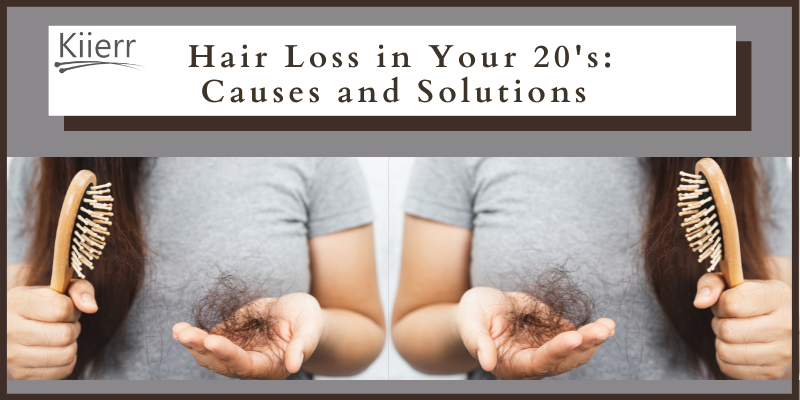When you’re a teenager, you see people who are balding and you automatically assume that it’s only an issue that people in their 40s, 50s, and 60s deal with. However, for many, it’s something that begins as early as age 20 or 25.
Table of Contents
Are Millennials Losing Their Hair Sooner Than Previous Generations

If you’re in your 20s and have recently noticed the onset or acceleration of hair loss, you’re not alone. According to a new research study, millennials are balding faster than any generation before them.
The study, which analyzed 4,000 students from Tsinghua University in Beijing, found that 60 percent of young people self-report losing significant amounts of hair. And while 25 percent of those surveyed say they didn’t notice hair loss until it was brought up by a friend or loved one, 40 percent say they’re very conscious of their balding and/or receding hairlines.
Long associated with age, hair loss is becoming increasingly common among young people. Those in and around the hair care industry are seeing it on a daily basis. Angelo David, a New York-based hairstylist, says more of his younger clients have overtly expressed concerns over thinning and receding hairlines in the past couple of years than ever before.
San Francisco dermatologist Dr. Andrea Hui says she sees men and women as young as 18 years old who are proactively seeking solutions and treatment options to help them combat hair loss. It’s a very real problem. The question is, what’s causing it?
4 Common Causes of Hair Loss in Your 20’s

Hair lives in a four-stage cycle where it grows, rests, falls out, and then regenerates. Hair loss occurs when this regenerative phase doesn’t kick back into action as quickly as needed (or at all). When it comes to young people in their 20s, the lack of proper hair growth may be tied to any number of common causes – including:
-
Stress
Stress can have a significant impact on your hair’s lifecycle, so it stands to reason that increased stress levels among millennials is one of the causes of accelerated hair loss. Stress dramatically affects the hair growth process by moving hairs out of the hair growth phase prematurely. This causes higher amounts of hair to fall out (and at a faster rate).
The connection between stress and hair growth/loss is something that the American Psychological Association (APA) has spent considerable time studying. According to their reports, millennials are more likely to report feeling isolated, lonely, and stressed than older generations. They also have a much lower capacity to cope. It’s believed that this is why stress-induced hair loss is so common among younger people.
-
Extreme Dieting
Social media is a breeding ground for health “ideas” and “experiments.” And unfortunately, this isn’t always a good thing. It can leave millennials prone to falling for extreme dieting fads that could lead to unintended consequences. Hair loss is one of them.
Extreme diets typically rely on aggressively eliminating certain types of foods, which may actually restrict your body of vital nutrients. When this happens, energy is shifted away from your hair (non-essential) and diverted to vital organs like the lungs, heart, and brain. The problem with this divergence of energy away from your scalp is that hair requires a ton of energy to grow. If you aren’t getting the proper blend of protein, vitamins, iron, and fatty acids – hair becomes brittle, thins out, and eventually fails to replenish. In other words, you go bald.
-
Improper Hair Styling
Millennials will often do anything just to look good for “the ‘Gram.” Unfortunately, these beauty hacks aren’t always healthy. And too much unhealthy hair styling over a period of time can lead to premature hair loss.
While heat styling tools like curling irons, straighteners, and blow dryers might make quick work of your hair, they also damage and dehydrate. This makes your hair more susceptible to damage, which may eventually translate into hair loss.
-
Medical Conditions and Genetics
Sometimes there’s nothing you can do about hair loss – it just happens. Early-onset hair loss is often the result of genetics. If you have a family history of hair loss, then it’s likely that you’ll experience hair loss as well.
As far as medical conditions go, certain hormonal changes – like during/after pregnancy – may lead to hair loss. Likewise, there are specific medications that are used to treat underlying health issues that are known to cause hair loss. Chemo drugs are most commonly known for causing hair to fall out.
How to Fight Back Against Hair Loss – Naturally

The great thing about your body is that it has the ability to regenerate and recover. Just because you’re losing hair right now, doesn’t mean you can’t reverse course. In addition to reducing stress and getting your diet back on track, here are a couple of proactive ways to fight back:
- Try LLLT. Low level laser therapy, also known as LLLT, is a simple and safe process that regenerates hair follicles by giving them an increased supply of energy and blood flow. With just 30 minutes per day, the Kiierr 272 Premier Laser Cap begins showing positive results in as little as 30 days. Best of all, you can wear it around the house or even while walking the dog around the block.
- Use a DHT-Blocker. When testosterone is converted into dihydrotestosterone (DHT) it can build up in the body and actually prevent hair growth by miniaturizing hair follicles. But with a DHT-blocking shampoo or supplement, you can normalize your DHT levels and prevent unwanted side effects.
By combining these safe and effective home treatment options with a healthier lifestyle, you can push back against hair loss and continue enjoying your youth.
Stop Hair Loss With Kiierr

Hair loss is natural and should be expected. But if you’re in your 20s (or even your 30s or 40s) and want to slow the rate of hair loss and sustain a healthy and full head of hair, a Kiierr laser hair cap system may be right for you. Try it risk-free today!







